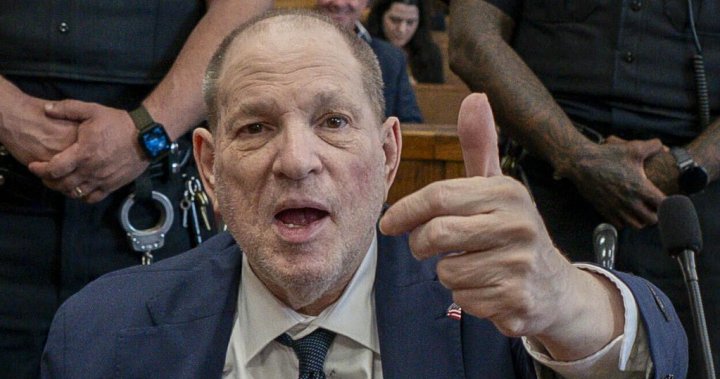Harvey Weinstein case judge declares mistrial on remaining rape charge – National

The judge in Harvey Weinstein’s sex crimes case declared a mistrial on the remaining rape charge after the jury foreperson said he wouldn’t continue deliberating.
Deliberations were ended Thursday, a day after the jury delivered a partial verdict in Weinstein’s sex crimes retrial, convicting the ex-studio boss of one of the top charges but acquitted him of another. Both of those charges concerned accusations of forcing oral sex on women in 2006. Those verdicts still stand.
The jury got stuck on a third charge involving accusations from Jessica Mann. The hairstylist and actor testified for days — as she did in 2020 — about the rape she said she endured in a Manhattan hotel room and about why she continued to see and have consensual encounters with Weinstein afterward.
Mann is ready to go to trial a third time, said Manhattan prosecutor Nicole Blumberg after the judge ended deliberations. No new trial date has yet been set.
The foreperson complained Wednesday that he felt bullied by another juror and said Thursday he wouldn’t go back into the jury room.
“No. I’m sorry,” he said when asked.
The jury of seven women and five men had unanimously reached decisions on the other charges last Friday, the foreperson told the judge. The verdict was delivered Wednesday only because Judge Curtis Farber asked whether there was agreement on any of the charges.

Get daily National news
Get the day’s top news, political, economic, and current affairs headlines, delivered to your inbox once a day.
The third charge was over a rape accusation involving a woman who also said she had a consensual relationship with the Oscar-winning producer. Under New York law, the third-degree rape charge carries a lesser penalty than the other two counts.
Weinstein denies all the charges. In an unusual exchange with the judge during some legal arguments before the partial verdict was disclosed Wednesday, he insisted it was unfair to continue the trial after two jurors came forward with concerns about the proceedings.
“I can’t be judged by a situation that’s going on like this,” said Weinstein, 73, saying the judge was “endangering” him.
Jury-room strains started leaking into public view Friday, when a juror asked to be excused because he felt another was being treated unfairly. Then Monday, the foreperson complained that other jurors were pushing people to change their minds and talking about information beyond the charges.
The man raised concerns again Wednesday. In a closed-door discussion with prosecutors, defense lawyers and the judge, the foreperson said another juror was yelling at him for sticking to his opinion and at one point vowed, “You going to see me outside.”
“I feel afraid inside there,” the foreperson told the judge and attorneys, according to a transcript.
Weinstein’s initial conviction five years ago seemed to cement the downfall of one of Hollywood’s most powerful men in a pivotal moment for the #MeToo movement against sexual misconduct.
But that conviction was overturned last year, and the case was sent back for retrial in the same Manhattan courthouse.
Weinstein’s accusers said he exploited his Tinseltown influence to dangle career help, get them alone and then trap and force them into sexual encounters.
His defence portrayed his accusers as Hollywood wannabes and hangers-on who willingly hooked up with him to court opportunity, then later said they were victimized to collect settlement funds and #MeToo approbation.
Miriam Haley, the producer and production assistant whom Weinstein was convicted — twice, now — of sexually assaulting, said outside court Wednesday that the new verdict “gives me hope.”
Accuser Kaja Sokola also called it “a big win for everyone,” even though Weinstein was acquitted of forcibly performing oral sex on her when she was a 19-year-old fashion model. Her allegation was added to the case after the retrial was ordered.
Weinstein also was convicted of raping another woman in California. He’s appealing that conviction.
The Associated Press generally does not name people who say they have been sexually assaulted, unless they agree to be identified. Haley, Mann and Sokola did so.
© 2025 The Canadian Press











